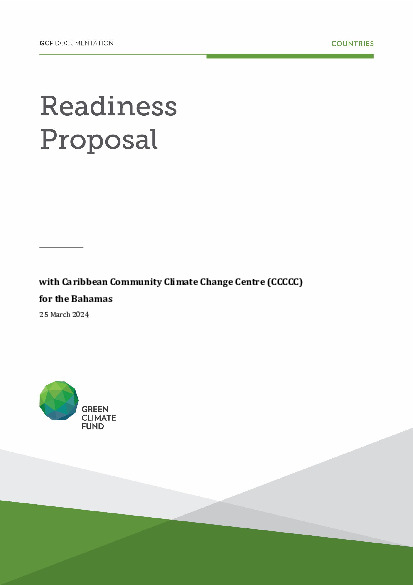Enhancing The Capacity of The Bahamas for Direct Access to Climate Finance

Enhancing The Capacity of The Bahamas for Direct Access to Climate Finance
The Bahamas is ranked as one of the top 10 most vulnerable countries in the world with regards to climate change and its impacts (Germanwatch, Global Climate Risk Index, 2021). Given the country’s high vulnerability, the country seeks direct access to climate finance to advance its mitigation and adaptation projects. Those legislations, policies and plans that are relevant to this readiness proposal include the Updated Nationally Determined Contributions, the Biennial Update Report, and the Climate Change and Carbon Markets Initiatives Act. The proposed readiness activities contribute to strengthening these legislations, policies and plans through capacity building, and establishing the foundation for improved access to climate finance which will support the mitigation and adaptation activities outlined in these documents. The Bahamas is currently revising its 2019 Country Programme and just completed its NDC in 2022. Capacity building and access to climate finance continue to be an urgent need for the country. This readiness proposal provides a framework for addressing the lack of Direct Access Entities within the country which is a barrier to accessing climate finance. This readiness support will enable The Bahamas to work toward advancing its programming by strengthening the capacity of three national financial institutions seeking to serve as direct access entities and advancing on the work on the renewable energy initiative that was started under BHS-RS- 006. The energy activities under this readiness proposal will enable The Bahamas to develop a pipeline of projects in the private sector and will also involve development of a knowledge sharing and learning mechanism that country stakeholders can access to aid them in developing proposals for GCF funding beyond the life of this readiness proposal. The main goal of this proposal is to increase The Bahamas’ access to climate finance and its capacity to deliver and implement GCF-funded projects, related to adaptation and mitigation, thus enabling the country to achieve its NDC targets, and affecting a systematic and positive change in The Bahamas’ national development planning. Overall objectives include:
- Assessing existing institutional gaps
- Developing a GCF compliant Monitoring and Evaluation Framework for financial institutions
- Relevant stakeholders being engaged and trained to support planning, programming, and implementation of GCF-funded activities; and
- Micro, small and medium-sized enterprises being better able to access funding for energy efficiency and renewable energy upgrades.
The direct beneficiaries of the Readiness support are the Bahamas Protected Areas Fund (BPAF), the Bahamas Development Bank (BDB), Access Accelerator, and those micro, small and medium enterprises that will be supported to advance climate action in The Bahamas. These direct beneficiaries are both from the government and private sectors. The indirect beneficiaries of the Readiness are local communities where mitigation and adaptation projects will be implemented as a result of the accreditation of Direct Access Entities in The Bahamas